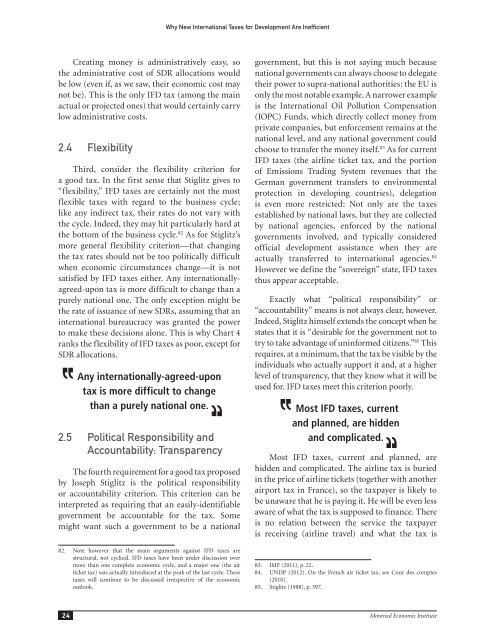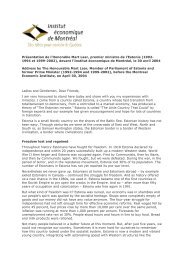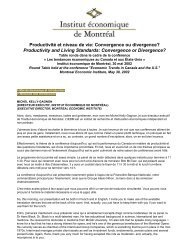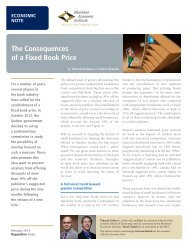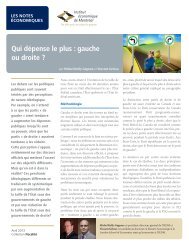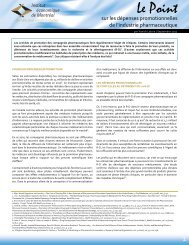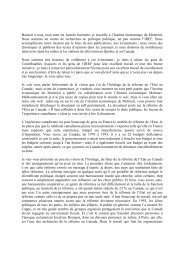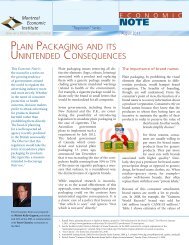Publication (PDF format) - Institut économique de Montréal
Publication (PDF format) - Institut économique de Montréal
Publication (PDF format) - Institut économique de Montréal
You also want an ePaper? Increase the reach of your titles
YUMPU automatically turns print PDFs into web optimized ePapers that Google loves.
Why New International Taxes for Development Are InefficientCreating money is administratively easy, sothe administrative cost of SDR allocations wouldbe low (even if, as we saw, their economic cost maynot be). This is the only IFD tax (among the mainactual or projected ones) that would certainly carrylow administrative costs.2.4 FlexibilityThird, consi<strong>de</strong>r the flexibility criterion fora good tax. In the first sense that Stiglitz gives to“flexibility,” IFD taxes are certainly not the mostflexible taxes with regard to the business cycle;like any indirect tax, their rates do not vary withthe cycle. In<strong>de</strong>ed, they may hit particularly hard atthe bottom of the business cycle. 82 As for Stiglitz’smore general flexibility criterion—that changingthe tax rates should not be too politically difficultwhen economic circumstances change—it is notsatisfied by IFD taxes either. Any internationallyagreed-upontax is more difficult to change than apurely national one. The only exception might bethe rate of issuance of new SDRs, assuming that aninternational bureaucracy was granted the powerto make these <strong>de</strong>cisions alone. This is why Chart 4ranks the flexibility of IFD taxes as poor, except forSDR allocations.,,Any internationally-agreed-upontax is more difficult to changethan a purely national one. ,,2.5 Political Responsibility andAccountability: TransparencyThe fourth requirement for a good tax proposedby Joseph Stiglitz is the political responsibilityor accountability criterion. This criterion can beinterpreted as requiring that an easily-i<strong>de</strong>ntifiablegovernment be accountable for the tax. Somemight want such a government to be a national82. Note however that the main arguments against IFD taxes arestructural, not cyclical. IFD taxes have been un<strong>de</strong>r discussion overmore than one complete economic cycle, and a major one (the airticket tax) was actually introduced at the peak of the last cycle. Thesetaxes will continue to be discussed irrespective of the economicoutlook.government, but this is not saying much becausenational governments can always choose to <strong>de</strong>legatetheir power to supra-national authorities: the EU isonly the most notable example. A narrower exampleis the International Oil Pollution Compensation(IOPC) Funds, which directly collect money fromprivate companies, but enforcement remains at thenational level, and any national government couldchoose to transfer the money itself. 83 As for currentIFD taxes (the airline ticket tax, and the portionof Emissions Trading System revenues that theGerman government transfers to environmentalprotection in <strong>de</strong>veloping countries), <strong>de</strong>legationis even more restricted: Not only are the taxesestablished by national laws, but they are collectedby national agencies, enforced by the nationalgovernments involved, and typically consi<strong>de</strong>redofficial <strong>de</strong>velopment assistance when they areactually transferred to international agencies. 84However we <strong>de</strong>fine the “sovereign” state, IFD taxesthus appear acceptable.Exactly what “political responsibility” or“accountability” means is not always clear, however.In<strong>de</strong>ed, Stiglitz himself extends the concept when hestates that it is “<strong>de</strong>sirable for the government not totry to take advantage of uninformed citizens.” 85 Thisrequires, at a minimum, that the tax be visible by theindividuals who actually support it and, at a higherlevel of transparency, that they know what it will beused for. IFD taxes meet this criterion poorly.,,Most IFD taxes, currentand planned, are hid<strong>de</strong>nand complicated. ,,Most IFD taxes, current and planned, arehid<strong>de</strong>n and complicated. The airline tax is buriedin the price of airline tickets (together with anotherairport tax in France), so the taxpayer is likely tobe unaware that he is paying it. He will be even lessaware of what the tax is supposed to finance. Thereis no relation between the service the taxpayeris receiving (airline travel) and what the tax is83. IMF (2011), p. 22.84. UNDP (2012). On the French air ticket tax, see Cour <strong>de</strong>s comptes(2010).85. Stiglitz (1988), p. 397.24Montreal Economic <strong>Institut</strong>e


